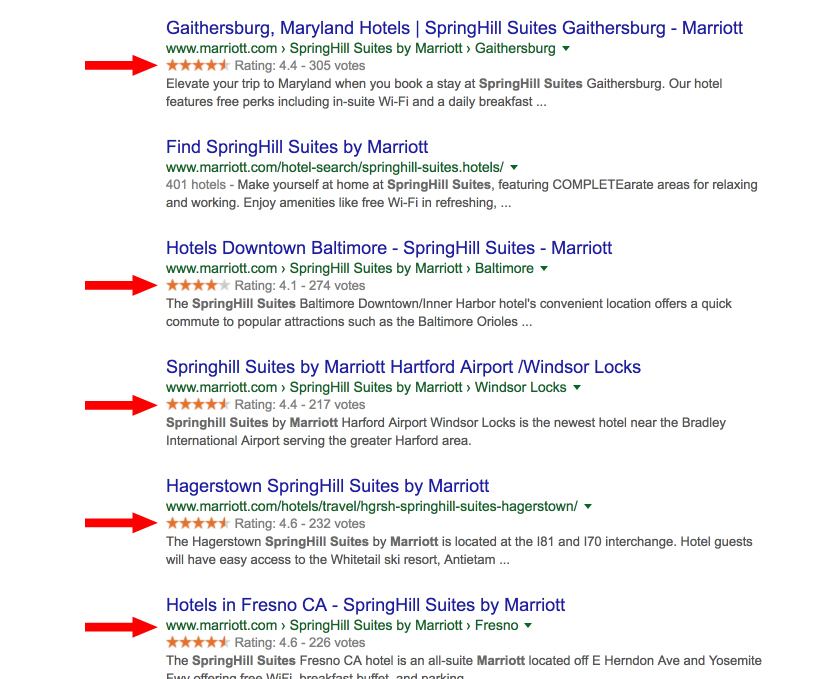
Reviews have the ability to improve your web positioning in search engines, help the user decide which pages to click on and facilitate the sale of products or services. Therefore, online reviews are as fundamental to your local SEO strategy as link building or SEO on-page, among others.
In the search results from Google will appear an extract with the average of your ratings and the total number of ratings, which allows the user to know the opinion of your clients about your business or a particular service or product. These snippets of reviews are available for local businesses, movies, books, music and other products and you can see them both in the organic results list and in the Google My Business or Google Maps tab of the company in question.
Starting from here, we will see how the reviews affect the decision-making of current consumers, where to add them to your web positioning strategy, how to get them and how to manage them so that they have a positive influence on your company’s online reputation. Let’s begin!
Some data that show us the importance of reviews written by users
- 54% of people will visit the website after seeing positive comments.
- 58% of users see the star rating of a business as the most important aspect.
- 70% of customers write a review if the company asks.
- 73% of people think that assessments of more than 3 months are no longer relevant.
- 74% of users say that positive reviews increase their confidence in a local business.
- 84% of people trust reviews as well as a personal recommendation.
- 90% of people read less than 10 ratings before forming an opinion about a business.
Let’s start with a devastating data: 90% of consumers say that their purchasing decisions are influenced by online reviews or reviews from other users. So if your business does not already have a strategy to manage your online reputation and get good valuations, be clear that you may be losing many sales opportunities.
How do consumers use reviews?
Before entering specific data on how consumers use online reviews and how they impact their decision making, it is important to be clear about where they fit into the cycle of purchasing products or services.
In general, when a user visits the reviews, they usually have a clear idea of the product they need and are immersed in the process of selecting a business that meets their needs.
But how many consumers really pay attention to reviews? Approximately 85% of consumers say they read reviews online. Being a little more exact, how many reviews do you consult before making a decision? Fortunately, there is also an answer to this question. 67% of consumers will read an average of 6 ratings before forming an opinion on a specific business.
This helps to understand from the perspective of the consumer how important are the reviews to help direct their purchasing decisions for better or worse.
At the consumer level, the reviews of other users are an invaluable source of reputation; therefore they act as influencers of purchasing decisions and are the key to increasing the sales of your business.
Besides, we must not forget the principle of persuasion related to social proof, by which, we seek to support, endorsement of others to make decisions and trust in what others tell us, even without knowing those people.
Why are reviews important for local SEO?
Search engines take reviews into account for a very simple reason, consumers also do. They are responsible for providing people with accurate information to help them make decisions about their future purchases. The faster they can do it, the more consumers will turn to them again and again.
According to MOZ, online reviews account for 10% of how Google and other search engines decide to classify organic results. A valuation may not have a noticeable effect on your short-term ranking, but over time and the increase of positive feedback from your clients, your ranking will increase significantly.
Reviews attract more visits to your website, which increases your click-through rate (CTR). If the opinions of your customers are good, it is more likely that the user decides to enter your page to find more information about your business. An increase in CTR can increase conversions. And with a higher CTR and more conversions, your ranking in Google will also benefit.
5 Benefits of SEO reviews
1. Offers to search engines new and relevant content
It is not always possible for a brand to produce tons of new content, especially if this content is produced specifically for SEO purposes, but search engines want to see activity on your site, so, what can your brand do to offer it to them? Collect content generated by the user!
The content generated by the consumer is a way to empower your site and your social media with unique and effortless content. This type of content shows that your site is valuable to the customers you serve. In addition, create conversations between the clients themselves.
2. Reviews create basic SEO attributes naturally way
Websites are optimized for search engines through a system of basic attributes, such as keywords, titles, backlinks or internal links.
When it comes to reviews, the clients who post them work for you as creators of links and keywords, so your SEO structure grows without you having to do anything.
3. The reviews help to position your website for long-tail keywords
In contrast to highly competitive search elements, long-tail keywords are specific phrases with low search competition that are much easier to classify. The problem here is knowing which keywords are beneficial for your business.
Fortunately, by looking at the actual comments of the clients and their writing, you can get an idea of which phrases to use as keywords on your site. This also helps to optimize your brand’s message on social networks to use those terms that your customers want to hear.
4. Valuations boost social SEO
The optimization of social media (SMO) is a form of optimization that deals specifically with social platforms. The content generated by the user, as the reviews help the SEO through the SMO, as it often brings with it social actions: likes, comments or the creation of common threads as hashtags that point towards your brand.
Social SEO relies heavily on user-generated content.
5. Reviews are beneficial for automatic and manual optimization
Automated search engine algorithms use spiders that track customer product reviews and testimonials to evaluate a website.
Besides, human teams known as search quality evaluators manually evaluate the reputation of a site, looking for aspects such as experience, authority, and trust, all of which are obtained through excellent customer content.
The content written by your clients offers credibility to your website in the eyes of the robots of Google and its team.
Therefore, it should be a vital part of any local SEO strategy, since reviews and ratings can make it easier to highlight in search engine results.
Do negative reviews hurt SEO?
Many people have a false belief that bad reviews hurt their web positioning. Actually, they do not penalize you in terms of SEO. Google knows that nobody is perfect and that even the best sites can get negative reviews. Maybe even someone from the competition has left a bad valuation on your site to try to reduce your online reputation.
Google’s review team takes into account the global computer of your reviews rather than a simple negative evaluation. With this, Google does not penalize sites that receive negative reviews if there is more content that confirms its good reputation.
How can I manage user reviews?
As we mentioned at the beginning, it is important to have a strategic plan to manage the different reviews received by your website. You can start by including these three basic actions:
· Ask your customers to write reviews.
The vast majority of them will not say no, and more if you have provided good service. Remind them at the end of each purchase or contract to go through your review space to discuss their personal experience.
· Respond to all reviews.
Whether positive or negative, do not leave any unanswered. It is important to show you close and make users see that your opinion is really taken into account and valued. Thanks for the comment and take the opportunity to indicate the service for which you obtained the review. So your potential clients will be clear about the area in which you stand out. If the reviews are negative, treat them with education and respect and try to offer solutions.
· Mark inappropriate reviews.
If any of the ratings do not comply with Google’s review policy, let them know. Google allows you to mark them as inappropriate if they are spam, add information not allowed, disrespect. But beware! You should not mark all negative reviews as inappropriate.
More and more users and potential customers take into account the opinion of other consumers when buying online. It is important that you encourage your clients to leave their comments. To avoid inappropriate reviews, show them how to write reviews on Google, explaining them:
- The importance of classifying the service from 1 to 5 stars, where 1 star is a very bad service and 5 is excellent.
- The Importance of writing the why of that assessment
- The importance of doing so from a real profile of Google Plus or Facebook as the case may be.
That’s all in today’s article. I hope you found it useful and that you start working on your reputation today through reviews from Google and social networks.
If you have interested this article, we invite you to visit these on related topics:
- Use these 6 principles of the Science of Persuasion (or Science of Influence) and start getting more customers before your competition does, or you may lose your business!
- SEO for Blogs 101: the Beginner’s Guide to Search Engine Optimization
- SEO for Beginners PART 2 -> How to Improve SEO Ranking on Google: How to Increase Page Rank
- How Can Social Media Content Help SEO Positioning
_______________
About the Author
 Mariana Panunto
Mariana Panunto
Department of social networks and web positioning in Aeuroweb.



